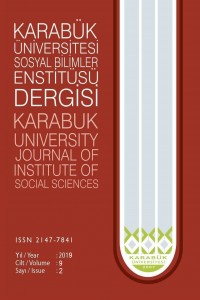Öz
Space used to be disregarded in scholarly works as it was thought to be secondary to time in accordance with dualistic worldview. However, this trend has come to be challenged with contemporary theories that problematize binary oppositions that are formed out of dualistic worldview, and space has gained attention. An understanding of space can contribute to an understanding of feminisms studies because women were disregarded as well by teleological and patriarchal thinking. This study aims to explore space and its relation to women by analyzing two signature feminist short stories of American literature and English literature, “The Yellow Wallpaper” and “To Room Nineteen” through Foucault’s theory of heterotopias. It is argued that the rooms where the heroines are secluded function as heterotopias where women find freedom and space of signification. The two short stories reveal signification of heterotopias within society for providing space for women and repercussions in the case of the loss of a heterotopia.
Anahtar Kelimeler
Kaynakça
- Amro, H. (2018). “A Breakdown or a Breakthrough?: ‘Madness’ in Charlotte Perkins Gilman’s ‘The Yellow Wallpaper,’ Doris Lessing’s ‘To Room Nineteen,’ and Khairiya Saqqaf’s ‘In a Contemporary House.’” International Journal of Language and Literature 6 (2): 146-156. Web. 20 May 2019. Bak, J. S. (1994). “Escaping the Jaundice Eye: Foucauldian Panopticism in Charlotte Perkins Gilman’s ‘The Yellow Wallpaper’.” Studies in Short Fiction 31(1): 39-51. Web. 27 May 2019. Foucault, M., Miskowiec, J (1986). “Of Other Spaces.” Diacritics 16(1): 22-27. Web. 20 May 2019. Gilman, C. P. (1995). “The Yellow Wallpaper.” Fiction 100: An Anthology of Short Stories. Ed. James H. Pickering. New Jersey: Prentice Hall, 481-492. Print. Lanser, S. S. (1989).“Feminist Criticism, ‘The Yellow Wallpaper,’ and the Politics of Color in America.” Feminist Studies 15(3): 415-441. Web. 27 May 2019. Lessing, D. (1993). “To Room Nineteen.” The Norton Anthology of English Literature. Eds. Meyer Howard Abrams and Stephen Greenblatt. New York: Norton, 2301-2322. Print. Seklem, İ. (2014). “A Comparative Study of ‘The Yellow Wallpaper’ and ‘To Room Nineteen.’” European Academic Research 1(11) 4695-4711. Web. 20 May 2019. Quawas, R. (2007). “Lessing’s ‘To Room Nineteen’: Susan’s Voyage into the Inner Space of ‘Elsewhere.’” Atlantis 29(1): 107-122. Web. 24 May 2019. Woolf, V. (2015). A Room of One’s Own and Three Guineas. Oxford: OUP, Print.
Bir Heterotopya Olarak İnziva: “The Yellow Wallpaper” ve “To Room Nineteen” Kısa Öykülerinin İncelemesi
Öz
Mekan, düalist düşünce yapısının zaman olgusuna önem vermesi sebebiyle bilimsel çalışmalarda ikinci planda kalmıştır. Bu yaklaşım, dünya görüşünü oluşturan ikili karşıtlıkları sorunsallaştıran güncel kuram çalışmaları ile değişmeye başlamıştır ve mekan bilimsel çalışmaların odağına girmiştir. Mekana dair anlayışın, feminizm çalışmalarına dair anlayışa da katkıda bulunacağı savunulabilir çünkü kadın olgusu da mekan gibi teleolojik ve ataerkil düşünce sistemi tarafından ikinci plana itilmiştir. Bu çalışma, mekanın kadın olgusuyla bağlantısını, Amerikan edebiyatından ve İngiliz edebiyatından, feminizmin temsili olan “The Yellow Wallpaper” and “To Room Nineteen” kısa öykülerini Foucault’nun heterotopya kuramı ışığında analiz etmeyi hedefler. Bu öykülerdeki kadın kahramanların inzivaya çekildikleri odaların, kadınların özgürlük, varoluş ve önem alanı buldukları heterotopyalar olarak işlev gördükleri öne sürülmektedir. Bu kısa hikayeler, heterotopyaların kadınlara bir alan sağlamaları açısından sosyal önemini ve heterotopyaların kaybının yol açacağı sonuçları gözler önüne sermektedir.
Anahtar Kelimeler
Kaynakça
- Amro, H. (2018). “A Breakdown or a Breakthrough?: ‘Madness’ in Charlotte Perkins Gilman’s ‘The Yellow Wallpaper,’ Doris Lessing’s ‘To Room Nineteen,’ and Khairiya Saqqaf’s ‘In a Contemporary House.’” International Journal of Language and Literature 6 (2): 146-156. Web. 20 May 2019. Bak, J. S. (1994). “Escaping the Jaundice Eye: Foucauldian Panopticism in Charlotte Perkins Gilman’s ‘The Yellow Wallpaper’.” Studies in Short Fiction 31(1): 39-51. Web. 27 May 2019. Foucault, M., Miskowiec, J (1986). “Of Other Spaces.” Diacritics 16(1): 22-27. Web. 20 May 2019. Gilman, C. P. (1995). “The Yellow Wallpaper.” Fiction 100: An Anthology of Short Stories. Ed. James H. Pickering. New Jersey: Prentice Hall, 481-492. Print. Lanser, S. S. (1989).“Feminist Criticism, ‘The Yellow Wallpaper,’ and the Politics of Color in America.” Feminist Studies 15(3): 415-441. Web. 27 May 2019. Lessing, D. (1993). “To Room Nineteen.” The Norton Anthology of English Literature. Eds. Meyer Howard Abrams and Stephen Greenblatt. New York: Norton, 2301-2322. Print. Seklem, İ. (2014). “A Comparative Study of ‘The Yellow Wallpaper’ and ‘To Room Nineteen.’” European Academic Research 1(11) 4695-4711. Web. 20 May 2019. Quawas, R. (2007). “Lessing’s ‘To Room Nineteen’: Susan’s Voyage into the Inner Space of ‘Elsewhere.’” Atlantis 29(1): 107-122. Web. 24 May 2019. Woolf, V. (2015). A Room of One’s Own and Three Guineas. Oxford: OUP, Print.
Ayrıntılar
| Birincil Dil | İngilizce |
|---|---|
| Bölüm | Makaleler |
| Yazarlar | |
| Yayımlanma Tarihi | 16 Eylül 2019 |
| Yayımlandığı Sayı | Yıl 2019 Cilt: 9 Sayı: 2 |

